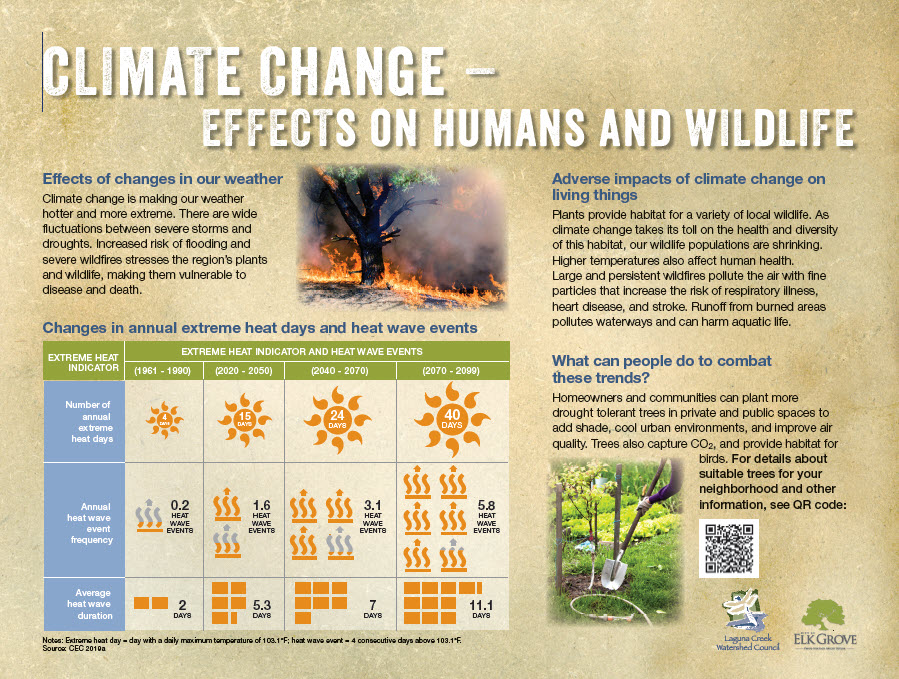CLIMATE CHANGE EFFECTS ON HUMANS AND WILDLIFE

Climate change is affecting us all. To foster a greater understanding of the nature of climate change and provide practical steps watershed residents can take to do their part to address the climate crisis, links are provide below with a brief summary of the information on each website.
This information is intended to supplement the interpretive signs installed along local creek trails. Please check back regularly as new material will be posted on a regular basis.
Overview of Climate Change
- Indicators of Climate Change in California: Drivers of climate change and its impacts on California and tribes: https://oehha.ca.gov/climate-change/document/indicators-climate-change-california Where should this go?
- City of Elk Grove Climate Action Plan – includes an explanation of what a CAP is: https://www.elkgrovecity.org/city_hall/departments_divisions/planning/city_special_projects/climate_action_plan
Heat island issue in the Sacramento region and in general:
- The heat island issue in Sacramento and how we can alter these changes: https://climatechange.ucdavis.edu/news/sacramentos-urban-heat-island-divide/
- A map of the hottest areas in the Sacramento region focused on low income neighborhoods and heat: https://www.capradio.org/articles/2020/05/26/summer-days-often-feel-much-hotter-if-you-live-in-one-of-californias-historically-redlined-neighborhoods/
-
The impact of heat islands and its general effects, including power usage and pollution of waterways:
Climate Change Impacts on Human Health:
-
Delves into health concerns and issues of climate change, focusing on regional/location impacts: https://www.cdc.gov/climateandhealth/effects/default.htm
-
Statistics about climate change and public opinion, increased heat, environmental disasters, respiratory health, vector-borne disease and equity. Climate Change and Public Health:
https://www.opr.ca.gov/facts/climate-change-and-public-health.html
-
Talks about those at risk of serious health issues and how to stay protected during fires: https://www.epa.gov/pm-pollution/how-smoke-fires-can-affect-your-health
-
Wildfire smoke and skin disease: https://www.ucsf.edu/news/2021/04/420376/first-its-kind-study-links-wildfire-smoke-skin-disease
-
Wildfire smoke an carry microbes that cause infectious disease: https://health.ucdavis.edu/health-news/newsroom/wildfire-smoke-can-carry-microbes-that-cause-infectious-diseases/2020/12
Climate Justice:
-
The relationship between racial disparities and climate change are explored: https://psci.princeton.edu/tips/2020/8/15/racial-disparities-and-climate-change
-
Why climate change is an environmental justice issue: https://news.climate.columbia.edu/2020/09/22/climate-change-environmental-justice/
-
Government can take steps to reduce the risks of climate change on vulnerable populations by addressing the root causes of inequalities.: https://www.un.org/sustainabledevelopment/blog/2016/10/report-inequalities-exacerbate-climate-impacts-on-poor/
Climate Change and impact on Wildlife:
-
Species affected by climate change and their importance in different ecosystems: https://www.worldwildlife.org/threats/effects-of-climate-change
-
The long lasting impacts of wildfire on wildlife:
https://www.pbs.org/wnet/nature/blog/wildfires-wildlife-wwf/
-
The impacts of climate change on wildlife habitat: https://www.nwf.org/Educational-Resources/Wildlife-Guide/Threats-to-Wildlife/Climate-Change/Habitats
-
Climate change effects on ocean wildlife, including possible extinction: https://www.c2es.org/document/coastal-and-marine-ecosystems-global-climate-change-potential-effects-on-u-s-resources/
-
Two-thirds of North American birds are at increasing risk of extinction from global temperature rise: https://www.audubon.org/climate/survivalbydegree
-
Climate change temperature rises impacts the EWL (evaporative water loss) in wet skinned amphibians as shown by the agar models in those respective environments, shallow water would be too warm for amphibians: https://www.nps.gov/articles/000/water-loss-compounds-amphibians-vulnerability-to-climate-change.htm
-
How frogs in ponds could vanish due to climate change: https://www.bbc.com/news/science-environment-48219217
-
Warming threatens reptiles more than birds and mammals: https://www.scientificamerican.com/article/warming-threatens-reptiles-more-than-birds-and-mammals/
Even though reptiles are unable to regulate their body temperature, a study has shown they are able to withstand up to 5.5 degrees colder temperatures than previously thought, reflecting the ability of lizards to adapt to warmer temperatures: https://sitn.hms.harvard.edu/flash/2020/climate-change-causes-collapsing-cold-lizards/
This article provides a description of various effects climate change has on health, including the effects of heat, air pollution, and vector-transmitted diseases. https://www.nytimes.com/2021/02/01/well/eat/climate-change-health.html?smid=em-share
This article describes the spread of bacteria and fungi associated with wildfire smoke:
https://www.latimes.com/california/story/2021-02-01/wildfire-smoke-microbes-in-the-air
Indicators of Climate Change in California is a report published by the Office of Environmental Health Hazard Assessment at Cal EPA which presents indicators describing how California’s climate is changing and how these changes are affecting the state. Indicators are scientifically based measurements that track trends in various aspects of climate change. The report includes information on drivers of climate change and impacts of climate change.
https://oehha.ca.gov/climate-change/document/indicators-climate-change-california
©Copyright 2021 Laguna Creek Watershed Council. All rights reserved.
Contact Laguna Creek Watershed Council
Wilton, CA 95693
